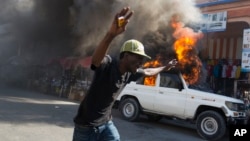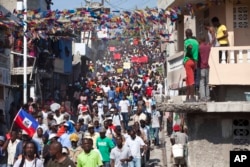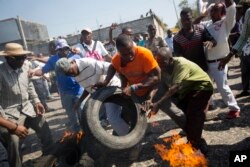Stone-throwing demonstrators on Monday smashed car windows and set at least two vehicles ablaze in Haiti's capital, hours after several electoral offices were attacked in northern towns as the country prepares for a Jan. 24 presidential and legislative runoff.
Roughly 2,000 protesters took to streets in downtown Port-au-Prince calling for new elections and the immediate removal of outgoing President Michel Martelly, among other grievances. Roads in the downtown slum of Bel Air were blocked with flaming tire barricades and at least a dozen motorists had their cars pelted with rocks. A truck and an SUV were torched by young men near a police station.
Most opposition protesters were dispersed and roadblocks cleared by late afternoon. Police scattered some demonstrators with tear gas in Bel Air, one of many impoverished areas where young people who've never held any kind of steady job are easy pickings for political actors looking for protesters for hire.
High school science teacher Elisme Nerius walked his 9-year-old son home from school near a barricaded intersection where black smoke was still billowing.
“My hope is that when my boy is old enough to vote, this country can finally hold decent and calm elections,'' Nerius said.
Offices set on fire
In northern Haiti, Police Inspector Michel Henri said three electoral offices were set on fire late Sunday in towns around the city of Cap-Haitien and at least two others were pelted with rocks and other objects.
Henri said the three offices that were set ablaze “weren't totally destroyed'' because locals managed to douse the flames.
Gerardo de Icaza, electoral observation director at the Organization of American States, tweeted Monday that the OAS mission “deplores and strongly condemns'' the violence targeting offices of Haiti's Provisional Electoral Council.
The OAS called on Haitian political actors to reject violence and “act peacefully.''
Allegations of fraud
Last month, several government buildings were burned and one demonstrator was killed in scattered violent protests sparked by the release of final legislative election results.
Campaigning for Haiti's presidential runoff kicked off earlier this month, but only government-backed candidate Jovenel Moise has been campaigning. Opposition presidential candidate Jude Celestin is boycotting the scheduled Jan. 24 vote and said his party will not send any monitors to polling stations.
“We are moving toward a selection, not an election,'' Celestin told The Associated Press on Saturday.
Celestin leads an opposition alliance alleging widespread electoral fraud in favor of Moise, Martelly's chosen successor.
The United Nations, the United States and the OAS have said they support holding the final round this month so a transfer of power to a new leader can take place by a Feb. 7 constitutional deadline. The first round of voting was held Oct. 25.
Electoral council officials have said that Celestin's name and photo will still appear on ballots because he never officially withdrew from the race, while the candidate asserts they have no right to do so without his authorization.
Over the weekend, Roman Catholic leaders in Haiti launched a last-ditch effort to help broker a solution to the electoral crisis, but it's unclear whether any progress is being made.
Augustin Jean Eden, who makes his living driving a brightly painted minibus known as a tap-tap, said he was worried that political gamesmanship would prevent any compromise.
“If they hold the elections on Sunday, Port-au-Prince will be a disaster. Who would come out and vote?'' he said as he watched a truck smolder.






